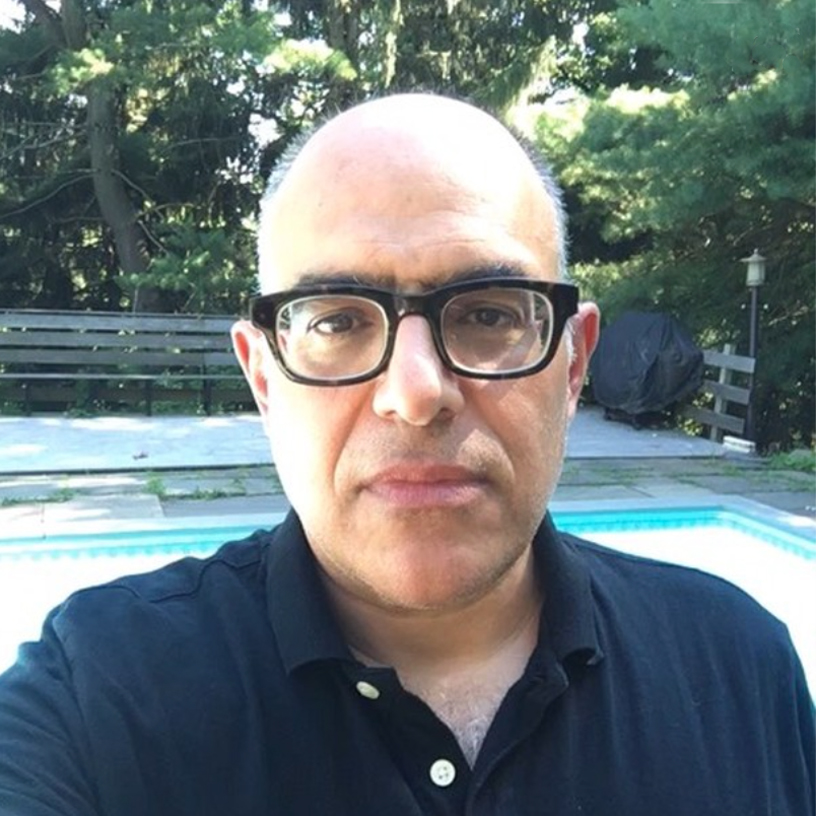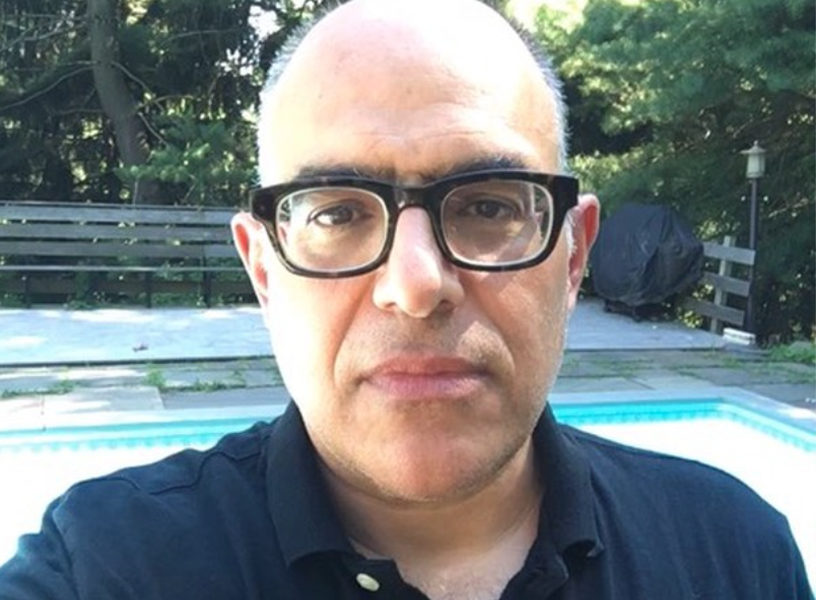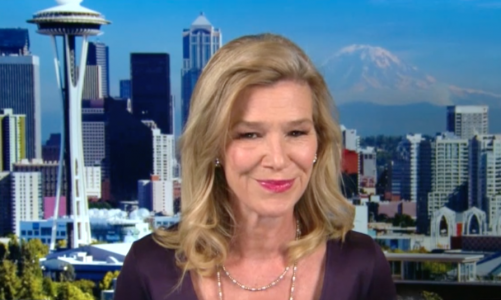
David Yazbek is an award-winning singer, songwriter, and comedy writer. He has released five solo albums (including Evil Monkey Man and Damascus), written for Late Night with David Letterman, and provided songs for film and TV, including the perennial earworm “Where in the World is Carmen Sandiego?” Yazbek has written five Broadway shows in the last 20 years: The Full Monty, Dirty Rotten Scoundrels, Women on the Verge of a Nervous Breakdown, The Band’s Visit, and Tootsie. His work has garnered him an Emmy, five Drama Desk Awards, a Grammy, and a Tony. He graduated with a B.A. from Brown in 1982.
Ben Connor: Do you have any particularly fond memories of your time at Brown? Or not fond, whatever’s more interesting.
David Yazbek: I have both! College for me was amazingly intense and active, and I was exposed for the first time to everything from Shakespeare’s history plays to John Cage’s music to the ARC 2600 synthesizer to Ghanaian drumming. That last one made a massive impact on me. I was in a band with a bunch of extraordinary, inventive musicians who played funk music, and a bunch of us went and took this Ghanaian drumming course, which completely informed our way of locking music together.
My band played two or three times a week at great clubs, and we opened for cool bands. And I had access to theatre facilities to do creative things. I took advantage of Brown to a very large extent on the non-academic side: I was able to do theatre and lots and lots of music. There were some great experiences, but I also had my first exposure to people with serious mental health problems. So I have great and harrowing memories.
And you did a production of Hair at Brown.
That was a tremendous experience. My parents had that album, so I had loved that show since I was an infant. I actually got to see it on Broadway, when I was way too young. In my senior year I had the overwhelming desire to put it on. I had an actor friend named Sean Clark— I think he’s a lawyer now— who knew how to direct actors. He and I assembled a cast, some of whom have gone on to have great careers as actors and singers, and did the show. And because there was an actual nude scene, we had lines coming out of the black box theatre. Production Workshop was in a black box on that building on the Main Quad, where the post office is. There was just a line of people going down the stairs, outside, hundreds of people. Everyone wanted to see that show, for whatever reason. It was a great band and a great cast, and it really came off.
So when school ended for the summer, I was still lingering there with Sean Clark. And we started thinking, is there a way we can take this show somewhere over the summer? We ended up renting out Harvard’s Hasty Pudding Theater, and raising like $2500. We brought members of the cast up there, rented a four-bedroom apartment in Somerville, and did the show. And it got great reviews, and ran until January or February. It was a great experience.
All of your musicals are adapted from movies. How do you avoid making a carbon copy of the film without letting down fans of the original?
The fact that all of my shows have been movies first isn’t a choice. It just happened that way. I’m writing two shows right now that have nothing to do with movies. But when you’re adapting a movie, there’s a few rules. If the movie feels like a perfect movie, then I don’t feel like I can adapt it. It’s nice if there’s something about the movie that you can tweak or improve on or jostle.
When I did The Full Monty, I was working with the late Terrence McNally, one of the great American playwrights, who had a knack for knowing how to honor preexisting material while making a show different. So, there’s a scene in the movie where these unemployed guys have been training to become dancing strippers, and they’re standing on the unemployment line. And one of them does a little move, and the rest start doing these little moves and you see that these dance moves they’ve learned are in their body. In a movie you can have a one-minute scene like that, but not in a musical. So in the show, there was a scene at a funeral with a little band on stage and a bass drum, and we just did the same gag there, where one guy and then another and then another start doing this little dance and then one of them says “Stop it! It’s a funeral!” That’s an example of honoring stuff that the audience wants to see. But there’s a really good rule of thumb that Robert Horn and I decided on for Tootsie, which is: the audience isn’t gonna remember anything about the movie if they like the show. They’re just gonna like it.
I think there’s a through-line in your music, but I have to say I’m at a loss for words to describe your style.
That’s good, that’s a compliment! I hear that all the time. People say “The music is completely different, but I know it’s you,” even when I’m not the one singing. I don’t know what it is, but it makes sense. There are certain choices you make musically because they excite you, and some of them are applicable over different genres and different styles of music. For me, groove is incredibly important. I’m good at writing catchy stuff, and I’m just lucky about that. And there are little choices you make in terms of where you go before coming back home to the tonic. So I don’t know. A lot of what I do I can’t explain. There are people who are good at what they do and can teach it, but I can’t. I’ve never spent time trying to analyze it. I think I’m afraid that if I do, the channel that connects to my gut impulse will be closed off.
One style I don’t like is musical theatre-sounding music. I just don’t like it. I’ll try things, and my corny meter will go off whenever there’s a juxtaposition of a base note and chords that sounds too musical theatre for me. I’ll do it sometimes as a gag, but usually it just makes my skin crawl. And because I’m sensitive to that, I’ll bounce off of those walls. A lot of it is which walls you bounce off and which doors you go through. I know a lot of very talented people who somehow see their shows as “the next John Doe show,” and I can’t see how that ever helps you, to have your name in your head while you’re trying to create. It seems like a very obvious blockade to doing your work with joy and ease.
You’ve described yourself as “bifurcated” between solo albums and musical theatre. Has that been an easy path to carve out?
There’s definitely always been a conflict there. I got my first record deal in my late 20s, and then I started putting out albums. And then I got this out-of-the-blue call to talk about writing The Full Monty. It opened, and people liked it, and I noticed that when my band played at Joe’s Pub and other rock venues, the audiences were growing. We used to draw 150 or 200 people, and then all of a sudden we were drawing 250, 300, 400. And a large percentage of that was theatre fans, not rock fans. I didn’t want to do “Jazz Odyssey” for the theatre crowd, so I had to plan out shows that were creatively fun and had growth potential for me and for the amazing musicians I play with, all while giving certain aspects of the audience what they came for. And I found certain songs from my shows that worked in that context, especially after writing Women on the Verge of a Nervous Breakdown.
Your score for Women on the Verge of a Nervous Breakdown is a real hidden gem. What was that process like?
We did the show through Lincoln Center, on Broadway from the get-go. For the record, I feel like Lincoln Center did us a disservice, in that we had asked early on where we were going to do the out-of-town tryout. And the Lincoln Center guys said “We don’t have to go out of town. Let’s just do a longer rehearsal period in town.” Jeffrey Lane, the book writer, and I both didn’t want to travel, so we said OK. We rationalized. But we could see after two or three weeks of rehearsal that we needed more time, time that Lincoln Center didn’t give us. Jeffrey and the director, Bart Sher, were changing structural things, but they didn’t have time to put them into the show.
So we opened, and in the middle of the first preview there was a big set piece going offstage on a truck, and suddenly you heard a sound that you never want to hear: the sound of rending wood and metal, like we sheared the entire top of a building. Like, that should never happen, right? That just shows you how we ran out of time. About two weeks after we opened to what were probably mixed reviews, the show was looking really good. A little late, though. And there were so many stars in it on Broadway, it was impossible not to disappoint people. Oh, Brian Stokes Mitchell only gets two songs? Oh, Patti Lupone only gets two songs? Well, we only have two and a half hours and we have a story to tell. But we did it again a couple years later in London, and we really worked on it and now it’s a great show. The leading lady in London, Tamsin Grieg, was so great. I’d really like to do it again back here.
The showstopper in Women on the Verge is the insane patter song “Model Behavior.” Was that an enormous feat to write?
That song was really interesting. There’s a patter song in Tootsie, too, sung by a very insecure actress talking about auditioning and why she’s worthless. So I called a few actress friends of mine to ask about auditioning and why they’re worthless. And I got material from that, put my own stuff in and wrote it.
With “Model Behavior,” my guess is Jeffrey probably said “You should write a patter song here.” and so I came up with that very Spanish ostinato. But what really had to happen was Bart Sher, Jeffrey Lane and I got in a room together to think it out for a few hours: Bart was seeing the stage in his head, Jeffrey was saying “And then she could go to a club, and she’ll say this and that.” And Jeffrey gave me so much great material for that. That song has some great jokes in it, several of which are Jeffrey’s. Of course I felt competitive as a joke writer and I had to write my own. But that song really did feel like a three-man job.
Even though you’re not a musical theatre guy, do you have favorite musicals?
Every song in Guys and Dolls is a winner, and funny. And West Side Story, because the music is so spectacular, and because of the dancing. I really love great dance, and you don’t see it anymore. And there’s individual Sondheim songs that I can psych myself up with when I’m having trouble getting to work, like “Please Hello” from Pacific Overtures. I think Sondheim has written some of the best single lines in musical theatre. And when I listen to the end of “Ladies Who Lunch,” I’m like oh, fuck, that’s just devastating. That’s something to aspire to as a songwriter. There’s Gershwin stuff and there’s a lot of Cole Porter stuff that I love, but it doesn’t sustain me. I think the Music Man is pretty close to perfectly structured, and Pajama Game has a lot of great stuff. Floyd Collins almost got there for me with Adam Guettel, and Light in the Piazza was beautiful to listen to as a composer. But Frank Loesser is my guy, in terms of musical theatre.
You’ve gotten to work with distinctive singers like Santino Fontana, Katrina Lenk, and Patti Lupone. Have you ever gotten the chance to cater the song to the singer?
Not very often, but the best example I can come up with is when we were in San Diego rehearsing for the out-of-town run of Dirty Rotten Scoundrels. The director, Jack O’Brien, would get in my face almost every day and say we needed a song for the two guys near the end, “A real Roxie and Velma song.” And as a person who doesn’t idolize musical theatre, I was like, ugh. But he was right. So I went into a rehearsal room with a piano and started writing specifically for John Lithgow and Norbert Leo Butz, and the result was the song “Dirty Rotten Number,” the big goodbye song.The funny part is that John Lithgow tells me that when I was sitting there going over this jazzy ostinato at the far end of the room with my back to the door, he actually came in and listened to me writing it for an hour. I just think that’s great.
What’s your relationship with critical response? Is the old image of everyone anxiously awaiting the opening night reviews a true one?
The Full Monty was 20 years ago, and there was an after-show party where everyone hung out and got drunk, and starting at midnight reviews came in, and they were great and everyone was really happy. That was the classic opening night situation.Then, with Dirty Rotten Scoundrels, a really interesting thing happened. Agents can sometimes see reviews before they’re published, so the morning of opening night, my agent called me and said “I have to warn you: you’re not going to get a good review in the New York Times. It’s not a bad review, but it’s this weird sort of nothing review.” And a couple of days later I told my agent “You can never do that again. You ruined my whole day and my whole night. I didn’t want to talk to anyone. It was devastating to get that news.”
Ben Brantley just didn’t get the show. And I decided I was never gonna read another review. So when we got this flood of great reviews for The Band’s Visit, I didn’t read them. And I like it that way, because there are some composers who read reviews and get very bitter, and stay bitter while they’re writing their next show. You don’t want to be playing your piano while you’re muttering “Fucking critics.” It’s not a good way to write music.
What’s it like to win a Tony, and where do you keep it?
It’s good to win a Tony. It’s so much better than losing, but it’s not that good. If you win a Tony, it doesn’t affect your life that much. I won my Tony during a commercial break, so when my name was announced I had to ask people who were milling about the aisles in Radio City Music Hall to move because I had to get up on stage. I was like “Excuse me, I just won a Tony, I gotta get up there.” People were looking at me like “Why are you bothering me?” There’s no way I could get upset about that, because I think the whole thing is so silly.
But after that, one by one, Ari’el Stachel won, and then Katrina Lenk won, and Tony Shalhoub, and Itamar Moses. That was really exciting, because they’re not as encumbered by whatever soggy cynicism I have. What you realize is, awards exist to some extent to make people money, including yourself. The Best Musical Tony is worth heavily lobbying for, not because of the award itself but because your show will run longer and more people will see it. So when we won Best Musical, I thought “Now we may actually be able to run at least another year.” I had the Tony on a shelf above my computer for about six months, and then I realized that seeing it didn’t help me work. So now I keep it in the back of my closet.
Are you at liberty to talk about any of your upcoming projects?
I’m working on a show with Itamar Moses. COVID has made everything weird, so I think we may do something filmed with it. It’s called Dead Outlaw; it’s about toxic masculinity in the U.S. and it’s loud. Jeffrey Lane and I have been working on something for years which is not based on a movie and he’s almost done with a draft of the first act, and I’ve got some songs, I need to write more. It’s very American, a real family show with a bit of adult darkness underneath. And there are two other shows that I think are probably gonna happen, one with Robert Horn. I’m doing an animated Disney film, but I can’t talk about that. You never know if those are gonna actually happen; you could go down the road a pretty long way and then it doesn’t happen. And I‘m making an album. That’s what I’m doing. Those projects pop up and go and pop up again, and you sort of do it when you have to.
*This interview has been edited for length and clarity.




